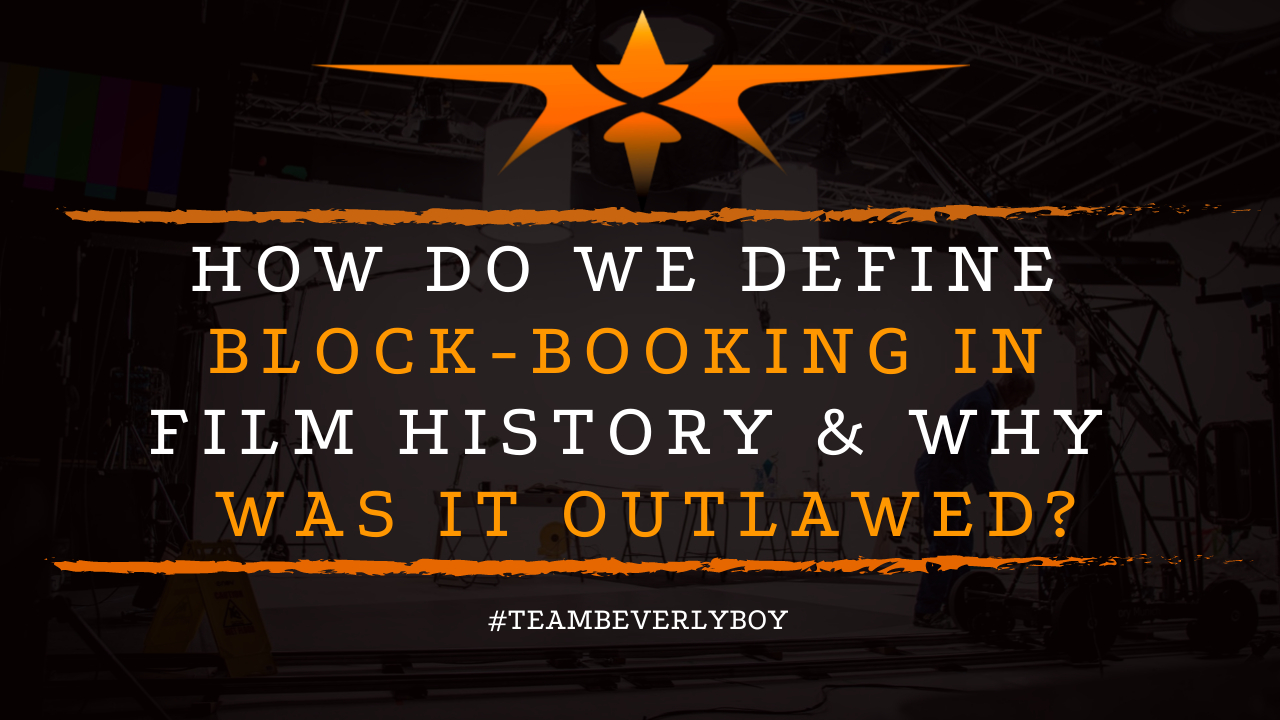
How do we Define Block-Booking in Film History & Why Was it Outlawed?
The film industry has seen a lot of change over the years. With many different steps having been taken to ensure the safety and efficacy of business owners. Particularly theater owners in this case. Historically, block booking is a practice that was outlawed nearly 100 years ago. But how do we define block-booking in film history and what caused the U.S. Supreme Court to outlaw this practice, anyway?

What is Block Booking?
Block booking was a system that Hollywood’s biggest studios would utilize. In order to sell multiple films as a package deal or single “unit” to theaters. Essentially, studios would package pictures unseen with A-class features and star vehicles.
So that independent theater owners would be forced to take large numbers of the studio’s lower quality films. All in order to get access to the single A-class feature or film.
Requiring the theater to purchase unseen pictures refers to a system that was called blind bidding. While block booking would ultimately become illegal.
Following a U.S. Supreme Court ruling in a 1948 case of United States vs. Paramount Pictures, Inc. The process of blind bidding is not prohibited on a federal level although some states do prohibit it individually.
Why Did Studios Use the Block Booking System?
Studios introduced the practice of block booking systems in the silent film era. As a means of leveraging theaters to balance out the economic costs tied into the production of films.
By forcing theater owners to take large numbers of the studio’s unseen pictures in order to have access to the feature the filmmaker was able to spread production expenses and make distribution operations more economical.
Throughout the late 1920s, block booking in film was incredibly popular. In fact, it was standard practice. If a theater wished to have access to the studio’s A pictures, it would have to rent the entire output.
Studios would insist that exhibitors (theaters) sign a contract with them in order to get exclusive productions. Thus, the entire season of films would be provided to the theater on an all or nothing deal.
Why was Block Booking Outlawed?

So, how do we define block booking in film history? It’s essentially the booking of an entire seasonal block in a theater. In which a studio would sell the theater the rights to a season’s worth of movies on an all or nothing basis.
Such that the theater would receive many unseen pictures in addition to the feature. Theaters would often bid not only on movies that they had not seen. But on films that were not yet even made.
This blind bidding, paired with block booking in which exhibitors were required to take entire blocks of films regardless of quality. Resulting in theaters frequently being burdened with films that lacked any quality at all.
Legal Complications
For independent producers, block booking caused a number of challenges. In terms of trying to get their own films into theaters. Since the major exhibitors were forced to purchase a block of films for an entire season.
Independents could not easily secure a slot for their own film to be shown. Additionally, independent films released through studio-owned exchanges would then be used by Hollywood distributors. As a way of pawning off their B-pictures.
Which were low-budget and less than valuable. Block booking was outlawed for a number of reasons. It was claimed that studios which required block booking of theaters were forming a monopoly.
This was a key area of concern which made block booking illegal. Additional concerns about block booking stated that selling a film. Without allowing the theater to first see the film could be likened to selling potentially poisonous food without first allowing examination.
Who Ended Block Booking?
Historically, block booking would become unlawful as of 1946. But many believe that Justice William O. Douglas was the key judge responsible for putting an end to the block booking system.
He recommended that the monopolies that had formed between studios and theaters be broken up. And that theater owners or businesses which co-owned both theaters and film studios, separate.
Ultimately, studio owner Howard Hughes would sell his theaters in order to abide by the request of then-Judge Douglas. Although some studios would continue to fight for their right to continue with a block booking system.
In which they could sell their B-films in packages with many other unseen films. The Justice Department would continue to be clear that such activity would not be regarded as lawful.
Antitrust Cases
An antitrust case would soon come about. This would further block the ability for studios, theaters, and upcoming television businesses to join forces. Paramount would ultimately sell its theaters.
So as to prevent any further legal issues associated with antitrust laws or block booking, the United States v. Paramount Pictures, Inc. et. Al. would prove the deciding factor in whether block booking would continue – or not. In this case, it did not!
In Summation
So, how do we define block-booking in film history and why was it outlawed? Block booking was a system of selling multiple films in a seasonal block or unit. Such that theaters would be forced to assume a mix of B-pictures. Or unseen pictures in order to acquire 1 or 2.
Or just a handful of A-pictures or features that they wished to show. Film studios used this block booking system to disperse the production costs. While assuming distribution for all of their films in a season.
Ultimately, block booking and the direct relationships that were being formed between studios and theaters would be found in violation of the Sherman Antitrust Act. And in 1938 this practice would no longer be accepted unless blocks were 5 films or less.
And regularly-held trade shows would provide advanced screenings for exhibitors. Rather than allowing unseen films to be packaged into the blocks. One of many ways that the film industry has evolved and changed throughout history.


